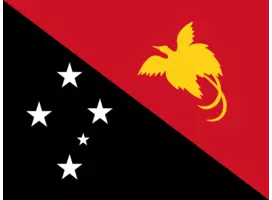- Home
- Papua New Guinea
- Papua New Guinea import / export regulation
Papua New Guinea customs regulation
Import and Export laws of Papua New Guinea
Papua New Guinea is a medium sized country with around 8M Papua New Guinean. Official languages are Hiri Motu, Tok Pisin and English. Papua New Guinea uses metric system (kilograms, centimeters, °C). Time zone is from UTC+10:00 to UTC+11:00. Currency used in Papua New Guinea is Kina (PGK).
🏙️ Port Moresby🗣️ English
👨👩👦👦 8M ☀️ ~25 °C 🌧 ~260 mm 👍 Developing 🚩 463k km2 (179k mi²)
Import Regulation
Tobacco 🚬
250 cigarettes; or
250 grams of other tobacco products.
Currency 💵
There are no restrictions on the import of local or foreign currencies.
Funds of more than SI$50,000 or its foreign equivalent must be declared to the customs authorities.
Prohibited ⛔
Counterfeit currency.
Goods produced using prison labour.
Knives that incorporate a lever or spring blade.
Matches containing yellow or white phosphorus.
Parrots, parakeets, or other birds of the Psittacidae family.
High Density Polyethylene plastic bags.
All gaming machines other than poker machines.
Silencers for use with firearms.
Goods that infringe on intellectual property rights.
Restricted ⚠️
Animals of all kinds and their semen require permission from theNational Quarantine and Inspection Service.
Fish and the spawn of fish require permission from theNational Quarantine and Inspection Service.
Advertising matter relating to objectionable material requires permission from the Censorship Board.
Controlled drugs, such as cannabis and cocaine, require permission from the Department of Health.
Medicinal and prescription drugs may require permission from theDepartment of Health.
Firearms and ammunition require permission of the Commissioner of Police.
Fireworks require permission from the PNG Customs Service.
Food products must be labelled in accordance with the Food Sanitation Regulation 2007, and may require permission from the Food Sanitation Council.
Goods that, in the opinion of the Minister for Customs, are of a dangerous character and menace to the community, require permission from the Customs Service.
Objectionable goods such as books, films, and other media, require permission from the Censorship Board.
Literature that advocates the overthrow by violence or force of any country requires permission from the Head of State.
Literature that incites disaffection, ill-will, or hostility against the Government or Constitution of Papua New Guinea or its people requires permission of the Minister for Customs.
Pesticides require a permit issued by the Minister for the Environment.
Plumage and skins of birds of paradise, crowned pigeons, and any of the several species of large crested pigeons known as Goura require permission from the Commissioner of Customs.
Poker machines require permission from the National Gaming Control Board.
Rice other than broken rice, glutinous rice, pre-packed meals, or brewers' rice must satisfy the control measures prescribed by the Ministers responsible for trade, health, and agricultural matters.
Radioactive substances require a permit issued by the Minister for the Environment.
Vaccines require permission of the Minister for Health and the Director of Agriculture.
Other rules ℹ️
1 litre of perfume.
New articles up to a value of K1000 for travellers 18 years and over, and K500 for travellers under 18.
Personal effects not intended for commercial use, such as laptops, sporting equipment, jewellery, toiletries, and cameras.
Export Regulation
Prohibited ⛔
Controlled drugs such as cannabis and cocaine.
Restricted ⚠️
Crocodiles and their derivative products require permission of theConservation and Environment Protection Authority.
Endangered species and products protected under CITES require a permit for export.
Timber and its derivative products require permission from thePapua New Guinea Forestry Authority.
Geological and fossil materials require Permission of the Minister for Mining.
Gold in pure form or otherwise requires permission from theBank of Papua New Guinea.
Any parts of human skeletons require permission from the head of State, acting on advice.
Pearl-shell oysters require permission from theMinister for Fisheries.
National cultural property requires permission of thePapua New Guinea National Museum and Art Gallery.
Property acquired in Papua New Guinea through unlawful activity requires permission from the Customs Service.
Pesticides require permission from theConservation and Environment Protection Authority.
Numismatic notes and coins require permission of theBank of Papua New Guinea.
Funds of more than K20,000 or its equivalent in foreign currency requires permission of theBank of Papua New Guinea.
External resources
National Quarantine and Inspection Service.National Quarantine and Inspection Service.
Censorship Board.
Department of Health.
Department of Health.
Conservation and Environment Protection Authority.
Papua New Guinea Forestry Authority.
Bank of Papua New Guinea.
Minister for Fisheries.
Papua New Guinea National Museum and Art Gallery.
Conservation and Environment Protection Authority.
Bank of Papua New Guinea.
Bank of Papua New Guinea.
Countries nearby Papua New Guinea
More on Papua New Guinea travel and visa information
All the informations you need to schedule your trip to Papua New Guinea.








